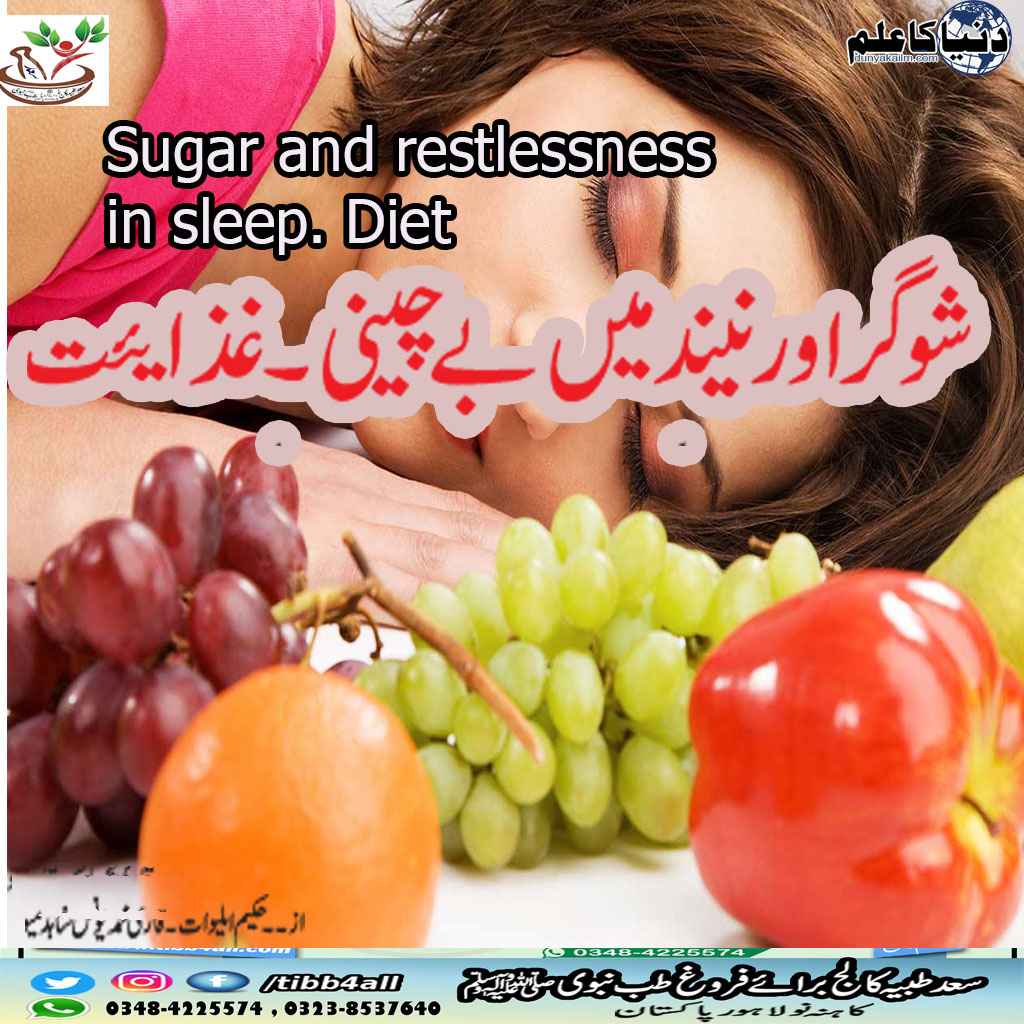- Home
- Tibb Information طبی معلومات
- Sugar and restlessness in slee ...

Sugar and restlessness in sleep. Diet

While some sugar before bed may not cause major problems for everyone, here are ten reasons why limiting sugar intake before bed can be beneficial.
- *Blood Sugar Spikes and Crashes:
- Sugar causes blood sugar levels to rise rapidly. This initial surge can provide a temporary energy boost, but is often followed by a crash. This accident can disrupt sleep patterns, causing difficulty falling asleep or waking up repeatedly at night.
Blood sugar spikes and crashes refer to the rapid rise and fall of blood sugar (glucose) levels in the bloodstream. This can be caused by a number of factors, including:
Consuming sugary foods or drinks:
These are slowly absorbed by the body, causing blood sugar levels to rise.
Not eating enough protein or fiber:
Protein and fiber slow the absorption of sugar into the blood, preventing spikes.
Skipping meals:
When you finally stop eating, this can lead to reactive hypoglycemia (low blood sugar), which causes your body to produce more insulin to compensate for the low levels.
Certain medical conditions:
Diabetes is a major cause of fluctuating blood sugar.
Effects of blood sugar spikes and crashes:
Blood sugar minutes These changes can have significant effects on your health and well-being, including:
Energy Level:
A spike in blood sugar can give you a temporary boost of energy, followed by a crash that leaves you feeling tired and lethargic.
Change in mode:
Fluctuations in blood sugar can lead to irritability, anxiety, and difficulty concentrating.
Increased appetite:
Crashes can trigger cravings for sugary foods to raise blood sugar levels again, creating a cycle of spikes and crashes.
Long-term health problems:
Over time, uncontrolled blood sugar fluctuations can increase the risk of chronic health problems like diabetes, heart attacks and strokes.
How to Avoid Blood Sugar Spikes and Crashes:
Here are some tips to help you keep your blood sugar levels stable:

Include plenty of fruits, vegetables, whole grains and lean protein in your meals.
Limit sugary foods and drinks:
Choose naturally sweetened options such as fruit and limit processed sugary snacks and drinks.
Don’t skip meals:
Eat regular meals and snacks throughout the day to keep your blood sugar levels stable.
Add protein and fiber to every meal:
These nutrients help slow down the absorption of sugar into the blood.
Manage stress:
Chronic stress can contribute to blood sugar fluctuations. Practice stress-reducing techniques such as yoga or meditation.
Exercise regularly:
Physical activity helps improve your body’s sensitivity to insulin, leading to better blood sugar control.
If you’re concerned about blood sugar spikes and crashes, especially if you have a family history of diabetes, it’s important to talk to your doctor. They can help you develop a personalized plan to manage your blood sugar levels and improve your overall health.
- *Increase in Destruction:
- Sugar can have a stimulant effect, similar to caffeine. This can make it difficult to settle down and relax before bed, leading to delayed sleep.
- *Poor quality of sleep:
- Studies have shown that high intakes of chia can have a negative effect on kidney function. It can reduce the amount of deep sleep, which is the most restorative stage of sleep.
Blood sugar spikes and dips refers to the rise and fall of blood sugar (glucose) levels in the blood. Reasons for this include:
Sugary foods or drinks:
These are quickly absorbed by the body, which increases the blood sugar level. Simple carbohydrate foods, such as white bread, pastries, and sugary drinks, are broken down quickly by the body, causing blood sugar spikes.
Lack of protein or fiber:
Protein and fiber slow the absorption of sugar into the bloodstream, preventing inflammation. Protein helps you feel fuller for longer, which reduces cravings and prevents overeating due to cravings. Fiber, found in fruits, vegetables, and whole grains, helps regulate blood sugar by slowing the absorption of glucose.
reason to eat:
This can cause reactive hypoglycemia (low blood sugar) when you finally eat, forcing your body to release a large supply of insulin. When you stop eating, your blood sugar levels drop. This can lead to sugary foods, cravings, and hunger. When you finally eat, your body quickly adjusts your blood sugar levels. A large amount of insulin is released to lower blood sugar levels, which then leads to a blood sugar crash.
Some medical conditions:
Diabetes is a major cause of blood sugar changes. Some people with diabetes have difficulty making insulin (type 1 diabetes) or become sensitive to the effects of insulin (type 2 diabetes). These chronically high blood sugar levels can cause blood sugar spikes.
Effects of highs and lows on blood sugar:
These rapid changes in blood sugar can have a big impact on your health and well-being, including:
Power Levels:
Blood sugar spikes can give you a temporary burst of energy, followed by a drop that leaves you feeling tired. This is because a surge of insulin after a spike in blood sugar can dramatically lower your blood sugar levels, leaving you feeling empty.
Mode changes:
Changes in blood sugar can include anxiety, depression, and difficulty concentrating. Blood sugar levels can also affect mood-regulating substances, such as serotonin and dopamine. This mod
- *Weight Gain:
- Consuming extra coffee throughout the day, including before bed, can lead to weight gain. These factors can further disrupt sleep due to increased stress on the body and possible lack of sleep.
- *Insulin Resistance:
- Over time, continued high fiber intake can lead to insulin resistance. This can further disrupt blood sugar regulation and potentially disrupt liver function.
- *Inflammation:
- Sugar can contribute to low-grade inflammation in the body. Chronic inflammation has been linked to a variety of health problems, including inflammatory bowel disease.
- *Hormonal Imbalance:
- Consuming caffeine can affect levels of the hormones leptin and ghrelin, which regulate hunger and sleep-wake cycles. An imbalance in these hormones can disrupt the menstrual cycle.
You are absolutely right. Dietary intake can affect the production of the hormones leptin and ghrelin, which play an important role in regulating the appetite and sleep-wake cycle. Here’s a breakdown of how sugar affects this hormonal dance: - *Leptin:
- Often referred to as the “satiety hormone,” leptin signals your brain that you’re feeling full and want to stop eating. It is produced by fat cells and released into the bloodstream after eating.
- *Household:
- This hormone is called the “hunger hormone” because it stimulates hunger and tells your brain that it’s time to eat. Ghrelin is produced in the stomach and its levels increase during meals, which increases your appetite.
- How Sugar Affects Leptin and Ghrelin:
- *Leptin Resistance:
- High levels of chiggers can lead to leptin resistance. This means that your body is sensitive to leptin signals. become less sensitive, although leptin levels may be higher. As a result, your brain doesn’t receive* “full” nutrition, leading to continued feelings of hunger and possible overeating.
- *Household Serge:
- Sugar can also cause a temporary increase in ghrelin levels after eating. It can increase hunger immediately after eating sweet foods, even if you have consumed enough calories.
- ** Consequences of Leptin and Ghrelin Disruption:**
- *More Desires:
- Leptin resistance and increased ghrelin can lead to a vicious cycle of cravings, especially for sweet or high-carbohydrate foods. This can lead to weight gain and difficulty managing calorie intake.
- *Patterns of sleep disturbances:
- Ghrelin levels naturally increase before sleep, and leptin levels usually decrease. When sugar disrupts this balance, it can lead to difficulty falling asleep due to hunger or frequent night wakings.
- Maintaining Hormonal Balance:
- Here are some tips for regulating leptin and ghrelin and promoting a healthy relationship with food and sleep:
- *Limit sugary foods:
- Choose balanced carbohydrates such as whole grains and fruit to provide sustained energy and stable blood sugar levels.
- *Add protein and healthy fats:
- These nutrients promote satiety and help regulate hunger hormones. Lean protein sources, such as fish and chicken, and healthy fats, such as avocados and nuts, can keep you feeling fuller for longer.
- *Eat regular meals and snacks:
- Don’t skip meals, as this can lead to ghrelin spikes and overeating at the next meal.
- *Prioritize sleep:
- Getting enough regular sleep can help regulate hormone production, including leptin and ghrelin. Aim for 7-8 hours of sleep each night.
- By managing your sugar intake and adopting healthy lifestyle habits, you can support a healthy hormonal balance for better appetite control, pain management and overall health.
- *Nutritional deficiency:
- Consuming sugary snacks before bed can eliminate healthy options that provide essential sleep-regulating nutrients, such as magnesium and potassium.
You are perfectly fine. Eating a late-night snack can end a healthy night’s sleep in a few ways: - Curb Appetite for Healthy Foods:
- Sugary snacks are usually hyper-palatable, since they are designed to make our taste buds more palatable. This gives rise to a phenomenon known as “sensory special effects”. Basically, after eating something sweet, your taste receptors become less sensitive to other flavors, making healthy foods like fruits or vegetables seem less appealing.
- Reducing the wave power:
- Sugary snacks can cause a sudden spike in blood sugar minutes followed by a drop. This decline can lead to a lack of intelligence. When you’re low on sugar, you’re more likely to overeat, turning to a sugary snack that’s immediately available again, rather than working hard to reach for something healthier.
- Feeling full but not nourished:
- Sugary snacks can fill you up with calories, but they’re usually lacking in essential nutrients like vitamins, minerals, and fiber. It leaves you feeling physically full, while lean meats are actually nutritionally deficient. Deficiency of these essential elements doesn’t set off body signals, making you want to eat more later.
- Sleep distance:
- As discussed earlier, chihuahua can affect the quality of the nandam. Poor sleep can further disrupt your hormone and appetite regulation, making it more difficult to stick to healthy choices later on.
- Making healthy options easy:
- Here are some tips to avoid sugary late-night snacks and make healthy snacks more interesting:
- Forecast:
- Have a healthy breakfast like butter with chopped fruit, burti with yogurt, or hummus with baby carrots. Being this busy can prevent you from grabbing sugary treats when the cravings strike.
- Repository mention:
- Keep items out of sight and reach. Stock your pantry and fridge with your favorite healthy snacks.
- Pair sugary foods with healthy snacks: If you need some nutrition, try pairing a low-sugar snack with a healthy fat or protein.
- This can help prevent you from feeling over-satiated and prevent you from overeating.
- Listen to your body: Pay attention to your hunger cues. Don’t force yourself to eat unless you’re really hungry, especially at night.
- Brush your teeth:
- Brushing your teeth after a night out can act as a psychological signal that it’s time to rest and avoid more snacks.
- By making conscious choices and snacking, you can avoid the sugary pre-breakfast trap and make sure you’re giving your body a good night’s sleep and nutrition throughout the day.
- *Vicious cycle:
- Poor digestion due to sugar can increase cravings for sweets the next day. This creates a cycle that can be difficult to break.
- *Energy Level:
- Although sugar provides a boost of energy, it can make you feel tired and sluggish the next day. This can negatively affect your mood and fertility.
You are absolutely right. Cheesy provides a quick burst of energy, but is usually followed by a slump that leaves you feeling tired and lethargic. Here’s why this happens: - The Blood Sugar Roller Coaster:
- Spike: When you consume certain foods or drinks, your body breaks them down immediately, causing an immediate increase in blood cyanide levels (blood cyanide spike).
- Insulin* res m:
- In response to the spike in blood sugar, your pancreas releases insulin, which helps your cells absorb glucose (sugar) from the blood for energy.
- Fall:
- When insulin pushes glucose into your cells, blood sugar levels drop dramatically. This decline is the reason why you feel tired and lethargic.
- Fallout Results:
- Energy Empty:
- Falling blood oxygen levels can leave your body feeling drained of energy. This means that your cells are no longer getting a steady supply of glucose.
- Mood swings: Changes in blood pressure can also affect your mood. Depression can lead to feelings of anger, anxiety, and difficulty concentrating.
- More Desires:
- A lack of energy can increase the desire for more hormones to raise blood cholesterol levels again, creating a spike-and-decline cycle.
- Options for switching to sustainable energy:
- To avoid fatigue and feel constant energy levels, adopt these strategies:
- Complex Carbohydrates:
- Choose carbohydrates from whole grains, fruits and vegetables. This food is digested slowly, which causes a temporary increase in blood pressure and subsequent continuous release of energy.
- Protein and healthy fats:
- Add lean proteins and healthy fats to your diet. These nutrients suppress appetite and help regulate blood sugar levels, making you feel fuller for longer.
- Organized Food and Drinks:
- Don’t skip meals or be very hungry. Regular diet and good throughout the day













